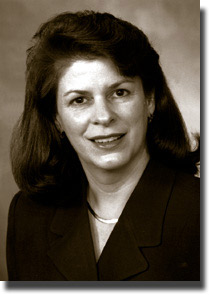
As one of the hospital’s first top
women managers, Deborah W. Davis, senior vice president, has demonstrated
her abilities in roles once considered for men only.
![]() A gifted high-school
student, she received a scholarship in computer science, but transferred
to ECU, where her future husband was a student. As an undergraduate, she
began working in the hospital’s department of materials management.
Soon, she was assuming more responsibilities, learning new roles and revealing
her versatility.
A gifted high-school
student, she received a scholarship in computer science, but transferred
to ECU, where her future husband was a student. As an undergraduate, she
began working in the hospital’s department of materials management.
Soon, she was assuming more responsibilities, learning new roles and revealing
her versatility.
![]() Within no time, she was
working her way up from the basement of the old hospital through various
departments, serving as President Jack Richardson’s assistant, where
she logged every check received, every day. She learned leadership from
the people around her. Soon, they asked her to join them.
Within no time, she was
working her way up from the basement of the old hospital through various
departments, serving as President Jack Richardson’s assistant, where
she logged every check received, every day. She learned leadership from
the people around her. Soon, they asked her to join them.
![]() After graduation, she
became administrator of the Rehabilitation Center, then followed Dave
McRae into Human Resources management. Meanwhile, she obtained a Master’s
of Business Administration degree from ECU. Later, she assumed supervision
of clinical services and then, leadership of daily operations.
After graduation, she
became administrator of the Rehabilitation Center, then followed Dave
McRae into Human Resources management. Meanwhile, she obtained a Master’s
of Business Administration degree from ECU. Later, she assumed supervision
of clinical services and then, leadership of daily operations.
![]() As senior vice president
since 1990, she oversees all hospital operations, working with executive
staff members from patient services, clinical operations, support services,
facility services and other departments.
As senior vice president
since 1990, she oversees all hospital operations, working with executive
staff members from patient services, clinical operations, support services,
facility services and other departments.
![]() She once planned to go
into the private sector after college, because she saw few opportunities
for women in health care. Though still considered newcomers, skilled women
professionals gradually entered the upper ranks of health care, bringing
new perspectives and capabilities to administration.
She once planned to go
into the private sector after college, because she saw few opportunities
for women in health care. Though still considered newcomers, skilled women
professionals gradually entered the upper ranks of health care, bringing
new perspectives and capabilities to administration.
![]() “I kept getting
promoted, and getting additional responsibilities,” Davis says. “I’ve
been in just about every area of the hospital.”
“I kept getting
promoted, and getting additional responsibilities,” Davis says. “I’ve
been in just about every area of the hospital.”
![]() As her knowledge increased,
so did her commitment. Growing up in the area in the early 1970s, she
traveled hours by car from her Jacksonville home so sick family members
could receive medical treatment.
As her knowledge increased,
so did her commitment. Growing up in the area in the early 1970s, she
traveled hours by car from her Jacksonville home so sick family members
could receive medical treatment.
![]() “There really were
no specialty services in eastern North Carolina,” she remembers.
Her deep love for the area inspired her to help change its health-care
future.
“There really were
no specialty services in eastern North Carolina,” she remembers.
Her deep love for the area inspired her to help change its health-care
future.
![]() “I decided this
really was what I wanted to do in life,” she says.
“I decided this
really was what I wanted to do in life,” she says.
![]() She’s grateful for
the help of others who helped her attain her lofty professional goals.
She’s grateful for
the help of others who helped her attain her lofty professional goals.
![]() “I had some good
mentors, people who were really supportive and willing to take some risks
with me,” she says. “They were willing to listen to a diversity
of opinions. That tapped into my desire to help eastern North Carolina.”
“I had some good
mentors, people who were really supportive and willing to take some risks
with me,” she says. “They were willing to listen to a diversity
of opinions. That tapped into my desire to help eastern North Carolina.”
Deborah W. Davis
The Brody School of Medicine at East Carolina University
600 Moye Boulevard
Greenville, North Carolina 27858-4354
P 252.744.2240 l F 252.744.2672